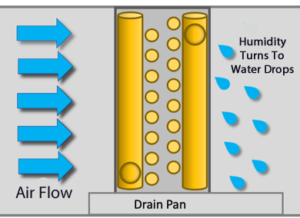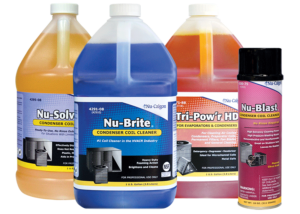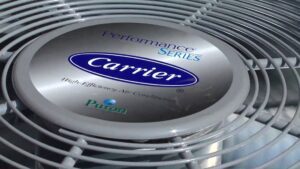A lot of Fort Lauderdale home and business owners may not be aware of how their air conditioning system actually works. Most people think that an air conditioning unit cools the air and that’s it. But to many peoples surprise the other main function of your air conditioning system is to remove humidity from your indoor air.
If you’ve noticed that your indoor air is cool but it’s starting to feels humid then you most likely have one of the following problems:
-
- Your thermostat fan is set to ON when it should be set to AUTO
-
- Your air filter is dirty or clogged
-
- Your indoor evaporator AC coil is dirty or clogged
-
- You have a refrigerant freon leak
-
- You have damaged or leaky ductwork
-
- Your air conditioning system is oversized or too big for your home or business
To give you a better idea of why your air conditioner isn’t dehumidifying we will explain each of these problems and what you can do to fix them. But first, let’s look at how your AC is supposed to dehumidify your home or business during normal operation.
Basic Explanation Of How Your AC Dehumidifies Your Home
There are 2 parts that make up your air conditioning system, an indoor unit (air handler) and an outdoor AC unit (condenser). The indoor air handler has a fan that circulates warm, humid air through your cold AC (evaporator) coil and the cold air is what you feel when you put your hand up to the air vents. But during your air conditioners normal operation it’s also removing humidity from the air.
Think of it this way. Have you ever had an ice cold bottled water and it starts to sweat water on the outside of it? That’s exactly what your cold indoor AC coil is doing, removing humidity from the air. As humid air passes through your AC coil the humidity in the air comes in contact with the cold surface of the indoor coil and turns that humidity into water droplets. The water droplets run down the coil and collect into a drain pan which goes down a drain line to the outside of the building.

So if your air feels humid even though the air is cool chances are you have an issue with your air conditioning that needs your attention. Let’s take a look at those possible issues we mentioned earlier.
Your Thermostat Is Set To ON
The first thing you want to check if your air conditioner isn’t removing humidity is your thermostat. Your air conditioners indoor fan is designed to run only during cooling cycles and then automatically shut off. When the fan shuts off, all of those water droplets on the surface of the coil have time to roll down into the drain pan and down the drain line. So the thing to remember is when your AC shuts off your indoor fan is also supposed to shut off so it can remove that water (humidity) from the coil.
Another thing that happens when your AC turns off is your indoor AC coil isn’t getting cold anymore and warms up. So if your fan is still running when the AC stops cooling all that condensate (water droplets) that’s still on the coil turns back into humidity from the warm air passing through it in addition to the warmer coil. Think of it this way. Heat (warm air, warm coil surface) turns water into a vapor (humidity).
The great news is all you need to do is turn your thermostat fan setting from ON to AUTO which will save you from having to call for an unnecessary AC repair.
Your Evaporator Coil Is Dirty Or A Clogged Air Filter
Your indoor AC coil (evaporator) is responsible for absorbing the heat and moisture from the warm, humid air inside your home. If your coil is covered with a layer of dirt, dog hair and lint it will not be able to cool or remove humidity very well. The surface of the coil needs to be clean so it has direct contact with the warm, humid air. A dirty or clogged air filter will have the same affect. So be sure to check that your air filter is clean.
If you’ve checked that your air filter is clean and your thermostat fan setting is on AUTO then it’s best to call a Fort Lauderdale AC repair professional and have the AC coil cleaned.
You Have A Freon (Refrigerant) Leak
Your air conditioner uses a refrigerant know as Freon which absorbs heat from your indoor air and releases that heat outside via your outdoor AC unit. Over time, the copper tubing that holds the Freon can develop leaks just from normal wear and tear. When this happens your indoor coil stops cooling and dehumidifying like it was designed to.
For a situation like this, we recommend calling a AC repair company in Fort Lauderdale to check your AC system.
You Have Leaky Or Damaged Ductwork
According to Energystar.gov – Houses with forced-air heating and cooling systems, ducts are used to distribute conditioned air throughout the house. In a typical house, however, about 20 to 30 percent of the air that moves through the duct system is lost due to leaks, holes, and poorly connected ducts.
Source: https://www.energystar.gov/saveathome/heating_cooling/duct_sealing#
Almost all ductwork leaks to some extent or another and here in Fort Lauderdale we use flexible ductwork. Flexible air duct can deteriorate over time and form cracks from age and the high South Florida heat in attics. If you have certain rooms that aren’t cooling, high humidity levels or high energy bills we recommend you call a license air conditioning repair service in Fort Lauderdale.
Cool My Air can inspect your ductwork to see what issues you may have.
Your Air Conditioning System Is Oversized
If your AC unit is sized to big for your home or business you’ve probably always had issues with high humidity or less than desirable cooling. When an air conditioner is oversized it cools your home very quickly and then shuts off. It does this over and over. This is called Short-Cycling. Short cycling prevents the AC from dehumidifying your home because the air cools too quickly and doesn’t have time it needs to circulate the humid air through your cold indoor AC coil.
If you suspect you have an oversized AC system give Cool My Air a call for a FREE estimate on a new AC installation.
Do You Need An AC Repair In Fort Lauderdale? Call Cool My Air today to schedule an AC repair at 954-298-0114.





